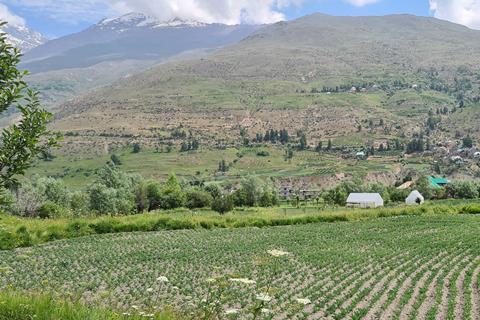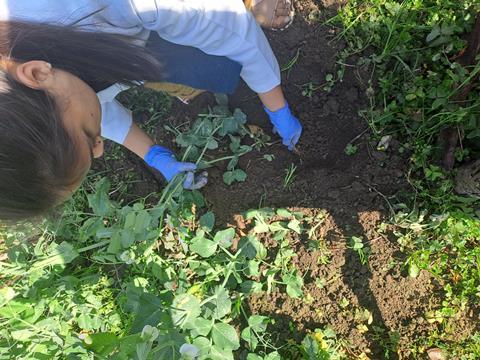Scientists have discovered a new Pseudomonas species isolated from cold Himalayan soil that helps to promote plant growth, offering potential as a bio-inoculant for sustainable agriculture in high-altitude regions.

The team from CSIR-Institute of Himalayan Bioresource Technology in India, outlined their discovery in a new paper published in the Journal of Plant Growth Regulation.
READ MORE: PGPR strain from farmland in India boosts crops in chilly conditions
READ MORE: PGPR Strategies for Climate-Resilient Agriculture
Corresponding author Dr Rakshak Kumar, who is a member of Applied Microbiology International, said the strain was found to enhance iron uptake and inhibit fungal pathogens, revealing its potential as a powerful bio-inoculant for sustainable agriculture in high-altitude regions.
“High-altitude regions, such as the Indian Himalayas, present a challenging environment for agriculture due to cold stress as it impacts plant growth, nutrient uptake, and overall crop productivity,” he said. “In addition to cold stress, crops in these regions are frequently threatened by fungal pathogens, which further reduce yield and quality. Diseases caused by fungal pathogens, like Fusarium wilt and corn smut, can devastate crops, affecting the livelihoods of farmers.”
Environmental risks
The use of chemical fertilizers, pesticides, and herbicides is common but these chemical inputs pose environmental risks, including soil degradation, water contamination, and harm to non-target organisms. Not only that, but their effectiveness is often reduced in cold environments. This paper aimed to explore the potential of psychrotrophic (cold-tolerant) plant growth-promoting (PGP) rhizobacteria as a sustainable solution to these issues.
“Specifically, the reported bacterial strain was capable of enhancing plant nutrient uptake, promoting growth, and providing biocontrol against fungal pathogens under cold conditions. By isolating and characterizing bacteria, the study aimed to develop bio-inoculant that could be applied to crops in cold regions, thereby improving yield and resilience against environmental stresses,” Dr Kumar said.
“The siderophore-producing bacteria can improve iron uptake in plants, which is critical in cold and iron-deficient soils. These bacteria also have biocontrol properties, enabling them to protect crops from fungal pathogens without relying on harmful chemicals.“
Cold stress
The study’s findings are highly applicable in the real world, particularly in regions where agriculture is challenged by cold stress and fungal pathogens.
“The novel Pseudomonas strain (AMR01) identified in the study demonstrates significant potential as a bio-inoculant, offering a natural and sustainable solution to enhance crop resilience and productivity in high-altitude environments. By promoting plant growth and providing biocontrol against fungal pathogens, AMR01 could reduce the dependency on chemical inputs, leading to more environmentally friendly and economically viable agricultural practices in cold regions like the Indian Himalaya.”

The research aimed to find psychrotrophic, plant growth-promoting (PGP) rhizobacteria that could enhance nutrient uptake and provide biocontrol against fungal pathogens, thereby offering a sustainable solution for these adverse conditions. The team had isolated 13 rhizobacterial morphotypes from high-altitude regions and identified one, designated as AMR01, with outstanding biofertilizer characteristics.
Novel species
Taxonomic analysis suggested that AMR01 is a potentially novel Pseudomonas species.
“We have optimized conditions for siderophore production and tested other PGP attributes, such as auxin and ammonia production, phosphate and potassium solubilization, nitrogen fixation, and hydrogen cyanide (HCN) production,” Dr Kumar said.
“AMR01 demonstrated a significant ability to inhibit fungal pathogens and enhance the germination and growth of fungus-infected seeds, evidenced by increased root and shoot lengths compared to uninoculated controls. Genomic analysis further supported AMR01’s potential by identifying genes involved in the synthesis of pyoverdine, HCN, and non-ribosomal peptide synthetases (NRPS).”
Unexpected discovery
“This research uniquely combines the physiological traits of a potentially novel Pseudomonas strain—such as siderophore production, nutrient solubilization, and pathogen inhibition—with genomic evidence of genes involved in pyoverdine synthesis, HCN production, and NRPS, highlighting AMR01’s potential as a bio-inoculant and pioneering the integration of psychrotrophic bacterial physiology and genomics to combat fungal phytopathogens in the challenging agro-ecosystems of the Indian Himalayas,” Dr Kumar said.
“What sets this research apart is the strain’s ability to enhance siderophore production through optimized conditions, even at temperatures as low as 10°C—where most microbes are less active. Current research employed Response Surface Methodology to identify optimal pH, iron, and ammonium nitrate conditions, significantly improving its siderophore yield in cold environments. This strain’s resilience and effectiveness under such low temperatures is rare, as most studies on siderophore-producing bacteria focus on species functioning under more temperate conditions,” he said
“The comprehensive genomic analysis revealing the genetic pathways responsible for these traits further underscores the novelty of this finding. The study’s integration of physiological and genomic insights provides a deep understanding of how this cold-adapted bacterium could be harnessed as a powerful bio-inoculant, making it an exceptional contribution to the field of sustainable agriculture in extreme climates.”
Next steps
To validate the effectiveness of the AMR01 strain in real-world conditions, extensive field trials should be conducted across various hill regions, beyond the Himalayan environment, helping to assess the strain’s adaptability and performance in different soil types, altitudes, and climatic conditions, Dr Kumar said.
“Future research could explore the synergistic effects of combining AMR01 with other cold-resilient, plant growth-promoting rhizobacteria. Developing multi-strain bio-inoculants might offer broader protection against a range of environmental stresses, such as varying degrees of cold, drought, and nutrient deficiencies, thereby enhancing the overall resilience of hill agriculture,” he added.
“Investigating the long-term impact of AMR01 on soil health is crucial. Research should focus on understanding how the introduction of this strain affects soil microbial diversity, nutrient cycling, and overall soil fertility over time. This will help ensure that the bio-inoculant contributes to sustainable soil management practices.
Agricultural settings
“Further research is needed to optimize the methods of applying AMR01 in agricultural settings. Studies could explore the most effective ways to introduce this strain to crops, such as seed coating, soil amendment, or foliar sprays, and determine the optimal timing and dosage for different crops and environmental conditions.
“Research should also focus on integrating the use of AMR01 with traditional agricultural practices prevalent in hill regions. This involves working closely with local farmers to ensure that the adoption of this bio-inoculant is culturally and economically feasible, thereby promoting its widespread use in sustainable hill agriculture.
“Collaboration with governmental and non-governmental organizations to develop policies and extension services that promote the use of bio-inoculants like AMR01 in hill agriculture is essential. Providing farmers with education and resources to implement these sustainable practices can ensure long-term success and environmental benefits.”
Further information
The study was led by Pallavi Sharma Girija Kaushal, Shruti Sinai Borker, Ayush Lepcha, Anil Kumar, and Rakshak Kumar. The work was carried out at the Biotechnology Division of the CSIR-Institute of Himalayan Bioresource Technology. Current affiliation of Dr Rakshak Kumar is the Department of Molecular Biology & Bioinformatics at Tripura University.
The study was financially supported by various organizations, including the Department of Biotechnology (DBT), Ministry of Science and Technology, Government of India, the Council of Scientific and Industrial Research (CSIR), and the National Mission on Himalayan Studies (NMHS) under the Ministry of Environment, Forest & Climate Change (MoEF&CC), which provided essential funding through multiple grants aimed at promoting research and development in the field of sustainable agriculture in the Indian Himalayan region.
Topics
- Agriculture
- AMR01
- Anil Kumar
- Applied Microbiology International
- Asia & Oceania
- Ayush Lepcha
- Bacteria
- Community
- CSIR-Institute of Himalayan Bioresource Technology
- Food Security
- Fungi
- Healthy Land
- Pallavi Sharma Girija Kaushal
- plant growth-promoting (PGP) rhizobacteria
- Pseudomonas
- psychrotrophic bacteria
- Rakshak Kumar
- Research News
- Shruti Sinai Borker
- Soil & Plant Science
- Sustainable Microbiology
- Tripura University







No comments yet